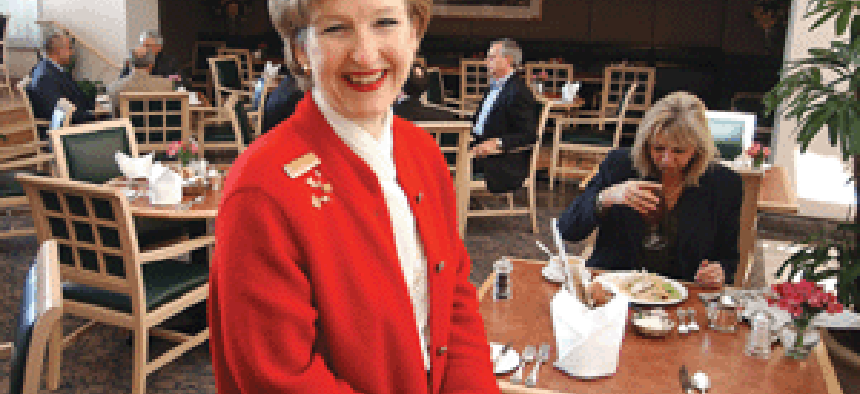Survival Guide: Ardell Fleeson, membership director for the Tower Club

Ardell Fleeson said the red sofas at the Tower Club entrance are a more effective networking venue than any industry event.
Ardell Fleeson said the red sofas at the Tower Club entrance are a more effective networking venue than any industry event. Everyone makes at least one new contact when they visit, said Fleeson, membership director for the Vienna, Va.-business club, a prime meeting place for the Washington area's high-tech movers and shakers. Fleeson makes connections for the club's 1,670 members, and also teaches job-search skills to out-of-work IT and telecommunications professionals. A consummate schmoozer, Fleeson is no stranger to the technology field. She was a sales manager for telecommunications companies ITT World Communications and Graphnet Inc., and for Xerox Corp. She spoke with Staff Writer Gail Repsher Emery about effective networking and the role of the Tower Club.Fleeson: We tend to be very reflective of markets. The club was founded in banking, real estate and land development. There was a huge crash in 1991 and '92 in Tysons [Corner], and the leadership discussion was taken over by defense contractors that were concerned about cutbacks. Then, in about 1996 the dot-com bubble started. We saw lots of investment bankers in this dining room, and lots of very young people who were getting dot-coms off the ground. The dot-com implosion, the telecom implosion and the Enron scandal made it a very painful two-and-a-half years, just like it was for everybody else. Now, we are into homeland defense, anti-terrorism, unstovepiping the government ? all those discussions happen here. The strength of the membership is federal information technology and intelligence, but in every iteration, the membership is always top-level executives. Fleeson: I think anti-terrorism is no bubble. This is going to go 10 to 15 years, because we are addressing nationwide and worldwide concerns. Fleeson: Part of it is familiarity, because we see them all the time. We have a system called the Red Star card. We read the star cards of everybody on the reservations list to the whole wait staff at a meeting we have twice a day, called lineup. We find out what they like to order, so we'll write that down. We know who is allergic to tomatoes, who eats only nonspicy food, and in some cases we know who not to seat near whom because they have had business differences. Fleeson: People ask me to introduce them to folks they could do business with. I will usually give them names of five or six people. I love putting people together who need each other. It gives me great joy. Sometimes I am asked to carry messages ? "Please ask Gen. Harding to stop by my table when he is done." Rarely do people come and stand by the other guy's table, because that interrupts conversation. People are respectful of other people's time with their clients, I think because of the pervasive sense that deals are being made all throughout the room. Fleeson: If three or four people who didn't know each other well are having lunch or dinner for the fourth or fifth time in a month, something is cooking. Deals might not happen at the table, but business entertaining is a huge part of the process. I've had phone calls from headhunters who say, "We are trying to steal so-and-so's CEO, and we would like to know what the most private table is in the Tower Club's dining room." I will say it is a very familial, enclosed community, and if you are doing something clandestine, you should sit in Leesburg, because everybody at the club is going to know.Fleeson: Not if you're as much of an extrovert as I am. It is hard for a lot of people. At my TelecomHUB support group, I recommended that in a job search, you need to be making 30 phone calls a day. A guest speaker said that to think of making 30 phone calls a day was the same as hitting himself in the head with a hammer 30 times a day. We are all wired differently. I also take every minute of my four weeks of vacation, which is good for my soul.

WT: Has the Tower Club clientele changed much over the years?
WT: So how long will this group last?
WT: You pride yourselves on knowing all 1,670 members. How do you do that?
WT: What's the best part of your job?
WT: How do you know when a deal is being made?
WT: You're so cheerful. Is it difficult to be always "on"?

Ardell Fleeson, membership director for the Tower Club
Olivier Douliery
WT: Has the Tower Club clientele changed much over the years?
WT: So how long will this group last?
WT: You pride yourselves on knowing all 1,670 members. How do you do that?
WT: What's the best part of your job?
WT: How do you know when a deal is being made?
WT: You're so cheerful. Is it difficult to be always "on"?
NEXT STORY: Northrop Grumman lands Army support work

